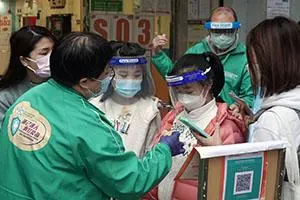PHOTO
HONG KONG - Hong Kong confirmed on Monday that its vaccine bubble will be expanded to include shopping malls and supermarkets, but said exemptions and random inspections would happen at some sites, as authorities battle a new record surge in COVID-19 infections.
The coronavirus outbreak has overwhelmed healthcare facilities in the global financial hub, with a new daily high of 7,533 infections and 13 deaths, among them an 11-month-old child, building pressure on the government.
As most major cities learn to live with the virus, Hong Kong has imposed its toughest curbs yet, with Chinese President Xi Jinping saying that reining in the disease is the city's "overriding mission".
Hong Kong's "dynamic zero-COVID" policies, mirroring those in mainland China, have contributed to its woes and are unsustainable, some experts say.
The government will launch a controversial "vaccine passport" on Thursday that allows only inoculated people to enter places such as supermarkets and clubhouses, a move some critics say raises privacy concerns.
The plan requires anyone aged 12 and above to have taken at least one dose of a vaccine to enter specified premises, except for those with medical exemptions, although inspections will be random at some sites, in view of straitened resources.
"Bringing your vaccine pass is the natural thing to do," said Kevin Choi, deputy secretary for food and health.
Operational difficulties in some places, such as shopping malls, supermarkets, and department stores, made it hard to ensure active checks, he added.
The final stage of the scheme, by the end of June, will see those older than 18 required to have had three vaccine doses, authorities said.
Public hospitals in Hong Kong have been severely stretched, with occupancy at more than 95%, as they struggle to cope with an influx of patients, including the elderly, many of whom have resisted vaccinations.
The fifth wave of the disease is "ferocious" and the government must allocate sufficient funds to help citizens and business, Financial Secretary Paul Chan, who is set to deliver the annual budget on Wednesday, said on his blog at the weekend.
Unless the budget provides unprecedented relief measures economists say, it will be hard to see how the economy can avoid contracting again after emerging just last year from its most prolonged recession, which lasted from 2019 to 2020.
(Reporting by Sara Cheng, Twinnie Siu and Anne Marie Roantree; Editing by Clarence Fernandez) ((annemarie.roantree@thomsonreuters.com; +852 97387151; Reuters Messaging: annemarie.roantree.thomsonreuters.com@reuters.net))





















